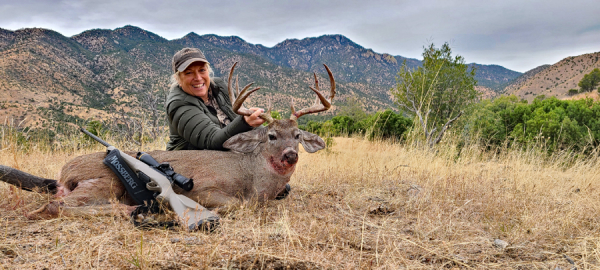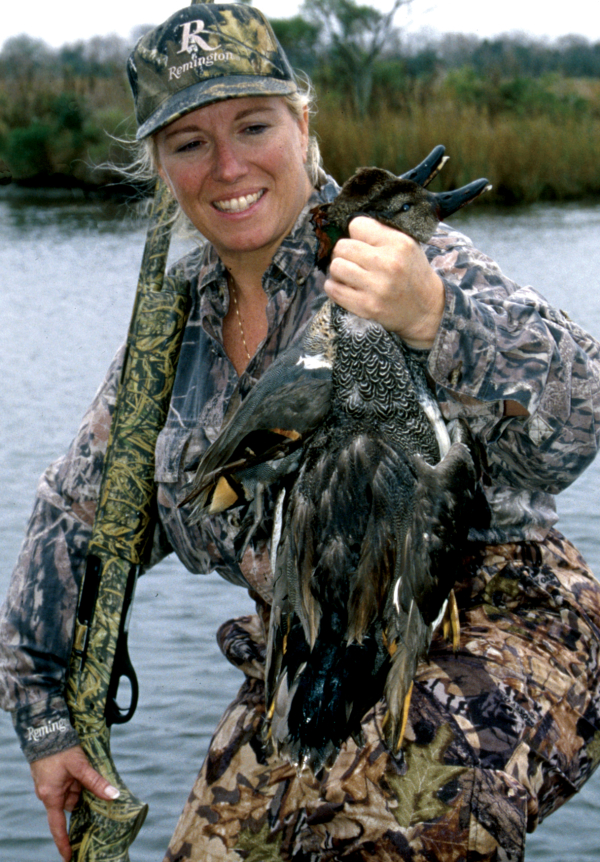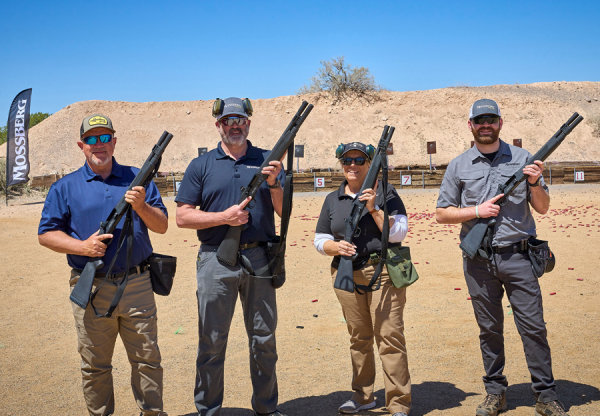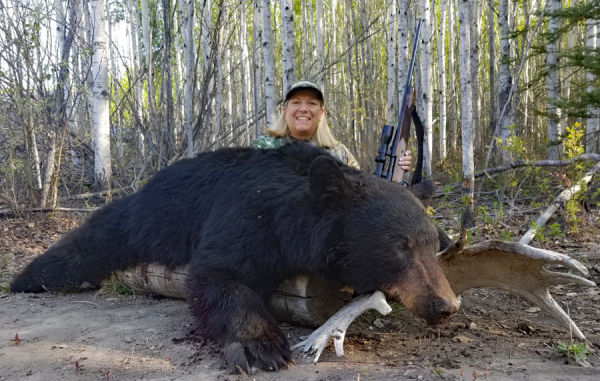Helping Novices Achieve Dreams and Countless Outdoor Communicators Tell Stories
By Ken Perrotte

Born and raised in North Carolina, Linda Powell didn’t discover her passion for the outdoors until later in life. Hired by The Remington Arms Company in June 1996 at age 37, she shot a gun for the first time and, a year later, ventured out on her first hunt, a Maine bear adventure. She first worked as an administrative assistant in the Remington and Stren Fishing Line public relations department before being promoted to Assistant Manager, Public Relations in 1999 and then Senior Manager in 2000. She stayed with Remington until 2010. Today, with 26 years in the firearms industry, she is Director of Media Relations at O.F. Mossberg & Sons, Inc. Now an accomplished hunter, Powell travels worldwide pursuing her favorite species; more importantly, she enjoys sharing those adventures with others as she hosts media groups in the field. She is also passionate about mentoring new hunters and is proud to have introduced her son and mother to hunting and encouraged several women to participate in the shooting sports. Powell’s commitment goes beyond her day job. She is a Life Member of the Rocky Mountain Elk Foundation (RMEF) and former RMEF Board Member (2010 – 2016), Benefactor Member of the NRA, member of the Boone and Crockett Club and Safari Club International as well as other conservation groups. She was inducted into the Legends of the Outdoors in 2018 and recently recognized with an NRA Golden Bullseye Award for Firearms Industry Woman of the Year. Ken Perrotte first hunted with Powell in 2003 on a media hunt for waterfowl in Louisiana. He interviewed Powell after a 2022 spring gobbler hunt in Canada where she shared her incredible story and offered thoughts on hunting’s future.
KP: What prompted your move into the firearms industry?
LP: Restlessness. I had worked in the medical field for 14 years and simply did not find it fulfilling. I signed on with a couple of temporary agencies to explore other career opportunities. While working for a hardware manufacturing company in their marketing department, I heard through friends that a major corporation (Remington) was moving their worldwide headquarters to a town nearby. I applied for a position, simply because I thought there might be an opportunity for growth at a larger company. Keep in mind, at the time, I had never shot a firearm, nor did I know the difference between a rifle and a shotgun. I was hired as the administrative assistant in the PR department, supporting two PR Managers and replacing a lady who held that position for 20 years.

KP: What was it like after the switch -- the learning curve?
LP: I was overwhelmed, to say the least. Remember, my knowledge of firearms, ammunition and this industry was zero and I replaced someone with 20 years of experience in that position. For the first six months or so, I cried many days on the way home, thinking I would never grasp the terminology or fill the shoes of the previous assistant. I compared it to learning a foreign language – the types of guns/actions, caliber/gauge, bullet types, and ballistics, etc. But as the months passed, I began to understand more. Two key things helped me through this journey: First, many people I worked with were willing to help me learn; to share their knowledge. So, I became resourceful in learning who to seek out for specific questions whether it be firearms or ammunition-related, historic or technical information, or simply to understand the industry. Second, I took a hands-on approach. Some of the guys in the office asked if I wanted to learn to shoot and they arranged for a day at the range, followed by a three-day shotgun course at the Remington Shooting School, and finally, a Becoming an Outdoor Woman course. After that first year, I was approached about going on my first media hunt, sponsored by Remington. I was game! So, with a year’s experience under my belt in the office, I was off to Maine for a black bear hunt with a muzzleloader. Not exactly, a typical first hunt, but I was successful and that was such a pivotal moment in my life; not just from a professional standpoint but personally as well. I became a hunter.
KP: Did you experience any challenges, such as expectations, a woman fitting into a traditionally male-oriented world, patronizing people, harassment, etc.
LP: There were some challenges during my early years. The industry was still very traditional, and male-dominated. As my role grew and I was in a higher visibility position, there were naysayers, stating I wasn’t qualified because I didn’t grow up hunting and shooting; that a woman shouldn’t be in the role of PR Manager representing the company; that it wasn’t appropriate for me to share hunting camps, primarily with men, etc. Interestingly, most of those people were within the walls of Remington. In retrospect, I view their responses more as jealousy or a sense of competitiveness. I found a completely opposite response from the industry and in particular, members of the media. I was welcomed with open arms and encouraged along the way. Many offered to help me gain more experience in the field; introducing me to key industry contacts and serving as cheerleaders, encouraging me not to get discouraged because of corporate pushback. In fact, several years ago, I hosted a mentored hunt to thank a small group of writers who were particularly supportive of me in those early years. But honestly, there are too many to thank. As far as negative experiences in the industry or in hunting camps, I can count less than five. Most of those I attribute to their cultural views of women not hunting or being in the field with men.

KP: How did you deal with any challenges? Work through the nuances?
LP: Maybe it is just my personality, but I took those naysayers on as a challenge versus giving up. I was determined to prove them wrong; to show them that not only did I deserve the role, but I would work hard to earn it. I believe in treating people with respect, being honest, receptive to learning, and dedicated. That was my secret to winning people over.
KP: Who were other women working in the industry then? Did you reach out for advice? Did they reach out to you to extend a welcome and share insights?
LP: At the time I joined the industry, there were very few women in high-visibility roles. Though a small group, they were very supportive. Barbara Mellman Skinner, Karen Lutto, and Sherry Kerr all reached out to encourage and support me. The industry, as a whole, was very welcoming and encouraging.
KP: As your career in the firearms industry evolved, what became some of your target missions, i.e., new hunters/shooters, increasing women's involvement, exposing new writers to the products, etc.?
LP: I believe that all hunters grow and the experience becomes less about you and more about sharing the experience with others. I’ve enjoyed becoming involved in conservation efforts and educational opportunities, particularly those encouraging women and new hunters/shooters to get involved. I’ve taken family members, friends, and even people I don’t know on their first hunts. It is fulfilling to watch their experiences as a new hunters; to see it through their eyes.
From a work perspective, there’s nothing I enjoy more than providing the opportunity for a writer to fulfill a personal goal – a species they’ve never hunted but has been on their bucket list; completing turkey slams; or taking an exceptional trophy. I love planning opportunities that will provide an interesting storyline. And in turn, showcasing Mossberg firearms.
KP: What type of interpersonal philosophy do you bring to the job?
LP: I always said that my job is primarily customer service and my customer base is the outdoor media. My goal is to do what I can to make their job easier, to provide story and photo opportunities, and build relationships that result in the promotion of Mossberg and building awareness of the brand and our products. And I’ll go back to my early statement that I have always focused on hard work, honesty, and respect.
KP: What are your thoughts on diversity in the outdoors, especially the hunting arena? How can the industry better promote diversity and increase?
LP: I have seen tremendous growth in diversity in the outdoors, but there is still room to include others. Mentoring is key; reaching out to communities and individuals who don’t have access or opportunities to hunt. The Hunting Wire was recently involved with a project, the Rookie Series, along with the National Deer Association and other sponsors to introduce first-time, adult hunters to deer hunting. Many organizations and individuals are stepping up.
KP: What advice do you have for 1) women/girls who want to become hunters or shooters but may not have a ready role model or mentor? and 2) women who might want to look at a career similar to yours in the firearms industry?
LP: First, if you don’t have a mentor, there is an abundance of information online now for new hunters and shooters; some that specifically target women’s questions/needs and provide information on recommended gear, educational opportunities, and simple “how-to” articles to get you started. Seek out a local gun club, state-supported or conservation organization programs for new hunters. I found the Becoming an Outdoor Women program to be particularly beneficial from a training perspective, but also in connecting with other women who had an interest in the outdoors. Next, for women interested in a career in this industry, look for opportunities to intern or volunteer with organizations connected to the outdoor industry. Networking is key. Start locally and be willing to accept new experiences as they arise. You never know what door will open if you simply start the journey.
KP: How long do you hope to continue working in the industry?
LP: I am in no hurry to retire. I still enjoy every day spent in the field, the planning and execution of media events, the interaction with others in the outdoors, and promoting the Mossberg brand.
KP: You have battled serious health issues in recent years. How are you doing?
LP: I’ve been open about my health issues. I have Stage 4 kidney disease and am on the list for a transplant. At this point, I have adjusted the types of hunts that I do, less physically demanding, but there are so many opportunities afield regardless of your health, age, or level of experience. If at some point, I need to slow down, I still hope to work in some way to promote hunting, shooting sports, and conservation.
KP: You spent nearly a quarter-century hunting big game, collecting myriad mounts/trophies/memories, but downsized and derived a superb outcome, selling many of the items to the University of North Carolina. How hard was it to let those go?
LP: Yes, during Covid, when life came to a halt, I spent some time re-evaluating life. One of my goals was to retire to the beach. I wasn’t ready to retire, but I began to think about making that move then (2020) since I work remotely. I also realized I wanted to downsize and simplify my life, so I could spend more time enjoying life. Though I enjoyed collecting trophies and memorializing those experiences, it felt like it was time to let those go. My son wasn’t really interested in my taxidermy collection, and I thought of the challenges he would have down the road in disposing of them. It simply felt like it was time to start the next chapter of my life (my beach life). I did keep a few mounts and I still have the memories along with lots of photos to relive those hunts.
KP: What are some of the countries you've hunted - brought writers to?
LP: Canada, Mexico, South America, South Africa, Tanzania, Russia and Spain.

KP: What were a couple of your favorites and why?
LP: My first hunt ever – that black bear hunt in Maine, because it changed my life. I became a hunter at age 37. My first backcountry big game hunt (horses, tents, etc.) for elk in Colorado was filled with so many exciting and new experiences -- things I never envisioned myself doing. And, of course, taking my son on his first hunt. As he said at the time, he didn’t have a father or grandfather that hunted, so if I hadn’t introduced him to hunting, who would have?
KP: What are some of your favorite types of hunting and why?
LP: Bears have remained a passion, having done over 30 bear hunts for black bears, grizzly and brown bears. I’m sure that bear is the first animal I pursued that had some impact, but I also have childhood memories of family vacations in the Great Smokey Mountains. My sister and I were in the back of the station wagon watching the roadside for bears. I love hunting western big game (elk and mule deer) as it is such a different experience than hunting in the east. And turkeys, it is hard to believe how addictive turkey hunting is. Enjoying those first days of spring as nature is waking up after a long winter; the heart-pounding thrill of a bird coming in or sometimes, as simple as hearing a lone gobble and wondering if you can entice him to come to your call. Honestly, any day in the field is a treat, regardless of what game I am pursuing.
KP: What do you see in terms of the future of hunting – concerns, caveats, threats, opportunities?
LP: My concerns related to hunting are lack of access – whether that means physical access to areas, or it means lack of access due to the costs of hunting. I am encouraged as more individuals are turning to hunting, thanks to the eating organic trend, and as more people took a step back to basics during the pandemic, wanting to enjoy the outdoors. And thanks to the addition of millions of new gun owners, the opportunities to introduce others to hunting are unlimited. We should all be receptive to welcoming new hunters and serving as mentors.
KP: I know you love music and have seen more than one photo of you posing with a favorite artist – Rick Springfield comes to mind - at a concert. What are some of your favorite things to do when you're not engaged in media work?
LP: Yes, I am a groupie! I love live music and enjoy traveling with friends for concert weekends. And the beach has always been my happy place. I was fortunate to move to the North Carolina coast about a year and a half ago, but I’m not satisfied with just one beach, so I enjoy vacationing in other tropical locations. The Bahamas is another favorite place. I am basically a travel junkie, trip with family, and friends, and sometimes solo.
2021-2022 The Hunting Wire Voice of Leadership Panel
The Voice of Leadership Panel is an appointed group of outdoor industry leaders who have volunteered to contribute their voices on key hunting and outdoor recreation issues to inform, inspire, and educate participants within our community.
Facilitators